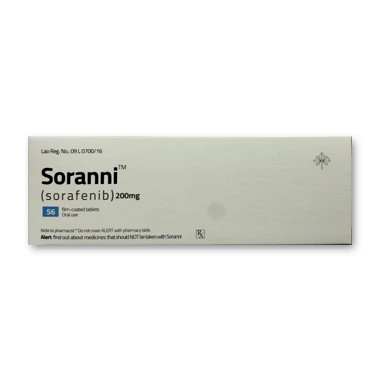What to Do If You Take Too Much Sorafenib? A Comprehensive Guide to Handling and Preventing Overdose

What to Do If You Take Too Much Sorafenib? A Comprehensive Guide to Handling and Preventing Overdose
In the field of cancer treatment, Sorafenib is a widely used and effective therapeutic drug for various cancers, including liver cancer, kidney cancer, and thyroid cancer. The recommended dosage is 400mg (2 tablets) twice a day, which can be taken on an empty stomach or with a low - fat or moderate - fat meal. However, accidental over - dosage or incorrect administration often occurs during the actual medication process. So, what should you do if you take too much Sorafenib? Are there any related policies such as "free medication after over - dosage"? Let's explore these questions in detail.
I. Potential Hazards of Sorafenib Overdose
Sorafenib is a targeted therapy drug. Its mechanism of action lies in interfering with the growth and spread of tumors. It controls the disease by inhibiting the proliferation of tumor cells and angiogenesis. However, if the dosage exceeds the doctor's recommendation, the body will face serious risks. Common symptoms of overdose include dizziness, nausea, vomiting, diarrhea, and other discomforts. More seriously, some patients may experience liver function damage, which affects the normal metabolism and detoxification function of the liver; it may also cause arrhythmia, interfering with the normal rhythm of the heart and threatening life and health.
II. Correct Ways to Deal with Sorafenib Overdose
When you find that you have taken an excessive amount of Sorafenib, staying calm is crucial. Panic may lead to wrong judgments and actions. You should contact your attending physician immediately and provide detailed information about the overdose, including the time and dosage. If the situation is urgent, go to the nearest medical institution for treatment. Doctors will take targeted measures according to the actual situation. Common treatments include gastric lavage to remove the unabsorbed drug in the stomach and reduce further drug absorption; fluid replacement to maintain the body's water and electrolyte balance and promote drug metabolism; and symptomatic supportive treatment to relieve various symptoms caused by overdose. During this process, patients should never take any self - treatment measures, such as blindly inducing vomiting or taking other drugs, to avoid more serious consequences.
III. How to Effectively Avoid Sorafenib Overdose
To reduce the harm caused by overdose, patients need to strictly follow the doctor's advice and prescription. You can use tools such as mobile phone alarms and calendar reminders to set regular medication reminders, reducing the probability of forgetting or taking the medicine repeatedly. During the medication period, pay close attention to your physical condition, record daily medication and physical reactions. Once any abnormal symptoms occur, even if they seem mild, report them to the doctor in a timely manner so that the doctor can adjust the treatment plan.
IV. Explanation of "Free Medication after Taking Too Much Sorafenib"
Currently, there is no universal and unified policy of "free medication after taking too much Sorafenib" in the market. However, some public welfare organizations and pharmaceutical companies launch patient assistance programs, providing certain drug assistance for eligible patients to relieve their economic burden. These programs usually have strict application conditions and procedures. Patients can consult doctors in the visiting hospital or relevant institutions for detailed information. In addition, Dingxiang International is stationed in India, entrusting direct mail purchases from India without going through third parties, which has been affirmed by many patients in the domestic field. If necessary, you can consult the customer service of Dingxiang International to obtain more information about drug procurement.
Case Q&A
Case 1: Mr. Zhang accidentally took an excessive amount of Sorafenib
Question: When taking Sorafenib, Mr. Zhang took 6 tablets at once due to a wrong memory of the dosage. After that, he experienced severe vomiting and dizziness. What should he do?
Answer: Mr. Zhang should immediately stop taking Sorafenib, stay calm, call the emergency number or go to the nearby hospital. He should truthfully inform the doctor of the time, dosage of the accidental overdose and the symptoms he has, so that the doctor can make an accurate diagnosis and treatment. The doctor may first perform gastric lavage on him, and then conduct fluid replacement and symptomatic treatment according to his physical indicators to relieve the symptoms of vomiting and dizziness, and closely observe whether the liver function and heart function are affected.
Case 2: Ms. Li took the medicine repeatedly
Question: Ms. Li took Sorafenib in the morning. At noon, she forgot that she had already taken the medicine and took it again. Does she need special treatment?
Answer: Ms. Li should contact her attending physician in time and explain the situation of repeated medication. The doctor will evaluate according to the time interval between her two doses and her physical condition. If the time interval is short and no discomfort symptoms occur, the doctor may suggest drinking more water to promote drug metabolism and closely observe subsequent physical reactions; if symptoms such as nausea and diarrhea occur, she needs to go to the hospital, and the doctor will determine whether further treatment is needed.

